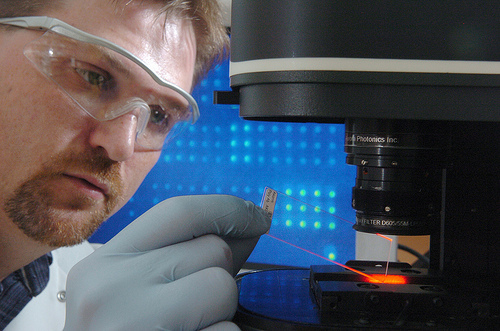As healthcare technology continues to advance, biochips are emerging as powerful tools for precision medicine, diagnostics, and drug discovery. These microdevices, capable of performing thousands of biological reactions in seconds, are transforming the way diseases are detected and treated. The biochip market is expected to experience substantial growth in the coming years, driven by technological advancements and an increasing demand for personalized medicine.
What is a Biochip?
Biochips are microelectronic devices that integrate biological materials and electronic components to perform complex biochemical processes. They allow for the simultaneous analysis of multiple biological components, such as DNA, RNA, and proteins, on a miniature scale. Biochips are most commonly used in the fields of genomics, proteomics, and drug development, where high-throughput screening and precise data analysis are critical.
The versatility of biochips makes them indispensable in modern healthcare, particularly in applications like early disease detection, genetic analysis, and drug response monitoring. Their ability to process vast amounts of biological data in a short time has led to significant breakthroughs in personalized medicine, allowing treatments to be tailored based on an individual’s genetic makeup.
Market Overview: Growth and Size
The biochip market was valued at USD 6.7 billion in 2023, and it is poised to grow rapidly, reaching USD 41.4 billion by 2032. This represents a CAGR of 14.36% from 2024 to 2032, signaling immense opportunities for growth in this sector. The rapid expansion is fueled by several key factors:
- Increased Prevalence of Chronic Diseases: Conditions like cancer, diabetes, and cardiovascular diseases are on the rise globally, necessitating advanced diagnostic tools.
- Rising Demand for Personalized Medicine: Healthcare providers are increasingly relying on biochips to tailor treatments to individual patients based on genetic profiles.
- Technological Innovation: Continuous advancements in microarray and lab-on-a-chip technologies are enhancing the efficiency, speed, and affordability of biochips.
Key Market Trends in 2024
1. Integration with AI and Machine Learning
Artificial intelligence (AI) and machine learning are playing an increasingly pivotal role in enhancing the capabilities of biochips. AI algorithms are used to analyze the vast datasets generated by biochips, enabling faster and more accurate diagnostics. Machine learning models can be trained to identify patterns in genetic data that may indicate disease risks or responses to treatments, significantly improving the accuracy of personalized medicine.
For example, AI-powered biochips are now being used in real-time health monitoring, where they continuously analyze a patient’s biological data and provide insights into their health condition. This integration with AI is helping healthcare providers deliver more timely and personalized care, particularly in managing chronic diseases.
2. Advancements in 3D Human-on-Chip Models
One of the most exciting advancements in biochip technology is the development of 3D human-on-chip models. These biochips mimic human tissue and organ systems, providing researchers with a highly accurate model to study drug responses and disease progression. Unlike traditional animal models, human-on-chip systems closely replicate human physiology, making them invaluable in drug discovery and toxicity testing.
In July 2023, Lebanese biotech company DLOC Biosystems announced a strategic partnership with 42 Technology, a product design and technology innovation consultancy, to optimize their 3D human-on-chip technology. This collaboration aims to develop fully automated biochips capable of replicating complex human biological systems. Such innovations are expected to drive the biochip market’s expansion by reducing the reliance on animal testing and increasing the speed of clinical trials.
3. Expansion of Genomic Research
With the increasing focus on personalized medicine, the demand for genomic research is surging. Biochips, particularly DNA microarrays, are integral to this research, allowing scientists to study gene expression, mutations, and polymorphisms efficiently. Genomics plays a crucial role in identifying disease markers, understanding genetic predispositions, and developing targeted therapies.
Countries around the world are investing heavily in genomic research initiatives, which is expected to fuel the adoption of biochips. For instance, programs like Genomics England and Precision Medicine Initiatives in the U.S. are helping expand the scope of biochip applications, further contributing to market growth.
4. Growing Demand in Emerging Markets
While developed regions like North America and Europe currently dominate the biochip market, emerging markets in Asia-Pacific are quickly catching up. Countries such as China, India, and South Korea are increasing investments in healthcare infrastructure, research, and development. Additionally, the growing prevalence of chronic diseases in these regions is creating a strong demand for advanced diagnostic tools like biochips.
With rising healthcare expenditures, supportive government policies, and increasing research activities, Asia-Pacific is expected to be one of the fastest-growing regions for biochips by 2032. This presents significant opportunities for global companies to expand their footprint in these markets.
Key Players Shaping the Biochip Market
The biochip market is highly competitive, with several key players leading the charge in innovation and technological development. These companies are focusing on developing more advanced biochips with higher throughput, precision, and functionality.
Major Competitors Include:
- Abbott Laboratories Inc.
- Agilent Technologies, Inc.
- PerkinElmer Inc.
- Fluidigm Corporation
- Illumina, Inc.
- GE Healthcare Inc.
- Bio-Rad Laboratories Inc.
- Thermo Fisher Scientific, Inc.
- F. Hoffmann-La Roche AG
- BioMérieux SA
- HORIBA, Ltd.
- QIAGEN N.V.
- Randox Laboratories Ltd.
- OriGene Technologies, Inc.
- Cepheid (Danaher Corporation)
These companies are heavily investing in research and development to bring innovative products to market. For example, Illumina is focusing on next-generation sequencing platforms, while PerkinElmer is exploring the integration of biochips with AI-based diagnostic solutions.
Applications of Biochips: A Revolution in Healthcare
Biochips have a wide range of applications across various sectors of healthcare and life sciences:
- Diagnostics: Biochips allow for fast, accurate, and cost-effective diagnosis of diseases such as cancer, infectious diseases, and genetic disorders. They enable early detection, which is critical in improving treatment outcomes.
- Drug Discovery and Development: Biochips are used to screen potential drug candidates, test their efficacy, and assess safety profiles. The use of biochips in this process accelerates the drug discovery timeline.
- Genomics and Proteomics: DNA and protein microarrays help researchers analyze large volumes of genetic and protein data, providing insights into disease mechanisms, potential drug targets, and genetic variations.
Challenges Faced by the Biochip Industry
Despite the promising growth, the biochip market faces several challenges:
- High Development Costs: The costs associated with designing, producing, and maintaining biochips are significant, particularly for smaller biotech companies.
- Data Management Issues: As biochips generate enormous amounts of data, managing, storing, and interpreting this data is a challenge, especially in real-time diagnostic applications.
- Regulatory Hurdles: Strict healthcare regulations and the need for rigorous clinical trials can delay product development and market entry.
Opportunities for Future Growth
Despite these challenges, the biochip market is ripe with opportunities. Technological advancements such as the integration of nanotechnology and biosensors into biochips will enhance their performance and broaden their application scope. Additionally, the growing role of artificial intelligence in biochip analysis presents an opportunity to improve the efficiency and accuracy of diagnostics.
As biochips continue to evolve, they will play a key role in personalized healthcare, allowing for more precise and effective treatments tailored to individual patients’ genetic profiles. Moreover, as the demand for early disease detection increases globally, biochips will become central to diagnostics and preventive medicine.
Conclusion: The Future of Biochips is Bright
The biochip market is at the forefront of medical innovation, with advancements in personalized medicine, diagnostics, and genomics driving its growth. As companies continue to innovate and collaborate, the future of biochips looks promising. With projected growth rates and increasing applications in healthcare, biochips are set to revolutionize the industry by providing more efficient, personalized, and data-driven solutions to healthcare challenges.
FAQ Section
1. What are the key drivers of the biochip market?
The biochip market is driven by the growing prevalence of chronic diseases, rising demand for personalized medicine, technological advancements, and increased research activities in genomics and proteomics.
2. How is AI impacting the biochip market?
AI enhances the speed and accuracy of diagnostics by analyzing the vast datasets generated by biochips. It also facilitates real-time health monitoring and precision medicine, improving healthcare outcomes.
3. Which companies are leading the biochip market?
Key players include Abbott Laboratories, Agilent Technologies, PerkinElmer, Illumina, Fluidigm Corporation, Thermo Fisher Scientific, and GE Healthcare.
4. What role does 3D human-on-chip technology play in the biochip market?
3D human-on-chip technology replicates human tissue and organ systems, providing more accurate models for drug testing and disease progression studies. This reduces reliance on animal testing and speeds up clinical trials.




